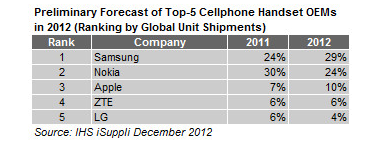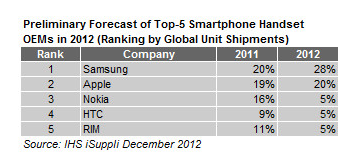The cellphone industry has a new king. South Korea’s Samsung is #1 in the market, unseating the Finnish-based Nokia after fourteen years. As 2012 wraps up, Samsung is responsible for 29 percent of all cell phone shipments, up from last year’s 24 percent.
Conversely, Nokia slips to #2, dropping to 24 percent of the market, a fall from 30 percent posted in 2011. Nokia’s departure from a top spot it held since 1998 is largely due to the predominance of smartphones, an area where Samsung thrived and Nokia faltered, according to the hardware research firm iSuppli…
However, the increasing adoption of smartphones places added stress on the Galaxy maker and could empower iPhone maker Apple.
Wayne Lam, a senior analyst for iSuppli’s wireless communication research, wrote Tuesday that the competitive reality of the cellphone market in 2012 was ‘live by the smartphone, die by the smartphone’, adding:
Smartphones represent the fastest-growing segment of the cellphone market – and will account for nearly half of all wireless handset shipments for all of 2012.
Samsung’s successes and Nokia’s struggles in the cellphone market this year were determined entirely by the two companies’ divergent fortunes in the smartphone sector.
While Samsung will see its share of smartphone shipped hit 28 percent in 2012 – an eight percent increase over a year ago – Nokia saw its share fall to five percent in 2012, down precipitously from sixteen percent a year ago, according to the research firm.
Meanwhile, Apple continues to play in smartphones only, targeting only the high-end market. Now, part of Nokia’s decline can also be traced to its move from the Symbian operating system to the Windows Phone software supplied by Microsoft.
Because of the rapid shift away from simple feature phones to smartphones, it is unclear whether Samsung can hold onto the overall #1 cellphone spot as long as Nokia. Like Nokia, Samsung sells both so-called dumb phones and smartphones, allowing it to lead Apple by almost 20 points.
The South Korean company has 29 percent of cellphone shipments versus ten percent for Apple, says iSuppli.
As such, Samsung must ensure its feature phone customers migrate to its smartphones, or at least sell enough smartphones to balance the dropping dumb phones. Currently, Samsung and Apple together control a combined 48 percent of the world’s smartphone shipments.
While this year saw the implosion of smartphone sales by Nokia and RIM and the resulting movement to other smartphone providers, prompting the eight point rise of Samsung’s top standing to 28 percent, the future isn’t as clear cut.
The two-way race between Samsung and Apple could become a bit more crowded in 2013 as Microsoft’s Windows Phone gains more fans. As well, Apple is expected to unveil a number of new and updated products, including the iPhone 6, a Retina-based iPad mini and perhaps the first US-made Mac since the 1990s.
Perhaps the most intriguing game-changer in 2013 that could spell trouble for Samsung is the seeming decision by Apple to return to an earlier mid-year product announcement schedule. Since the iPhone 4S, Apple’s competitors have had most of the year to unveil their rival smartphones and tablets, position them as better than the iPhone or iPad.
Additionally, not only would the slow launch drain away some potential buyers, but the timing made Wall Street uneasy. With a target on its back as the top cellphone and smartphone maker, Samsung should be in for an interesting 2013.
As for Apple, it has always performed well as the underdog.
In all races, it is better to be the challenger than the leader of the pack.
Wouldn’t you agree?




